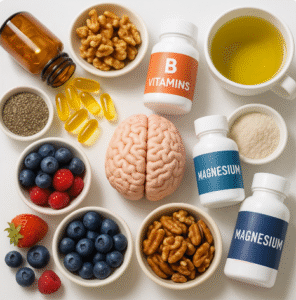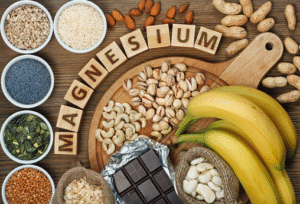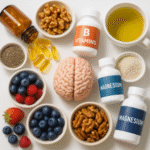Elevate Your Cognitive Function with Essential Supplements for Enhanced Memory and Focus
To attain optimal brain health, it is vital to prioritise overall wellness, particularly as we traverse the intricate phases of ageing. A balanced diet, complemented by a healthy lifestyle, forms the cornerstone for cognitive vitality; however, the addition of specific supplements can provide that crucial extra advantage. The market brims with a myriad of brain health supplements, including Omega-3 fatty acids, antioxidants, and probiotics. These potent supplements play a vital role in safeguarding memory, enhancing focus, and boosting mental clarity. In this comprehensive article, we will delve into some of the most effective brain health supplements, spotlight reliable sources in the UK, and furnish practical guidance on seamlessly incorporating them into your daily regimen.
If you prefer listening rather than reading, click the audio link below.
Explore Reputable UK Brands for Premium Brain Health Supplements
Choosing the most suitable brain health supplements entails selecting products from reputable and trustworthy brands to guarantee both quality and efficacy. In the UK, numerous companies have built solid reputations for their adherence to high standards and scientifically-backed formulations.
A leading name in this domain is Biocare, a highly regarded brand that provides a wide array of supplements geared towards brain health, featuring specialised formulations enriched with Omega-3 fatty acids, B vitamins, and magnesium. Biocare is celebrated for its commitment to research and practitioner-led product development, making its supplements commonly recommended by healthcare professionals to enhance cognitive support and promote overall health.
Another noteworthy option is Cytoplan, a UK-based company that emphasises food-based supplements and ethical sourcing practices. Cytoplan presents an impressive selection of brain health supplements, including comprehensive multinutrient blends specifically crafted to boost cognitive function, memory, and mental clarity. Their products are underpinned by decades of research and are favoured by individuals seeking high-quality, bioavailable nutrients.
For consumers in search of a globally competitive option that offers exceptional value, LiveGood provides a subscription model that delivers premium-quality supplements at accessible prices. LiveGood meticulously selects ingredients to formulate brain health supplements that enhance mental performance, focus, and cognitive longevity. Their dedication to transparency and affordability makes them an attractive choice for consumers prioritising both health and cost-effectiveness.
By opting for supplements from reputable brands like Biocare, Cytoplan, and LiveGood, consumers can confidently invest in products that effectively support their brain health responsibly.
Discover the Remarkable Benefits of Omega-3 Fatty Acids for Cognitive Function
Extensive research highlights the crucial connection between Omega-3 fatty acids and brain health. Studies consistently demonstrate their significant role in sustaining optimal cognitive performance. Specifically, Omega-3s, including EPA (eicosapentaenoic acid) and DHA (docosahexaenoic acid), are essential components of brain cell membranes and are vital for neuronal formation.
According to research, the supplementation of Omega-3s has been shown to enhance memory and cognitive function, particularly among older adults and those experiencing cognitive decline. Omega-3s also exhibit anti-inflammatory properties within the brain, which may significantly reduce the risk of neurodegenerative diseases such as Alzheimer's. Given the brain's high susceptibility to oxidative stress and inflammation, ensuring adequate intake of Omega-3s represents a proactive strategy for preserving cognitive health over the long term.
Essential Guidelines for Achieving Optimal Omega-3 Dosage
Health recommendations from esteemed organisations, such as the British Heart Foundation, suggest that adults should strive for a daily intake of 450mg of combined EPA and DHA. This target can be achieved through a combination of dietary sources and supplementation. For individuals who find it challenging to consume adequate amounts of fatty fish regularly, Omega-3 supplements present a convenient alternative.
It is crucial to note that while supplements can aid in meeting the recommended intake, they should complement—not replace—a well-rounded diet. A diverse dietary intake rich in fruits, vegetables, whole grains, and lean proteins remains vital. Prior to commencing any new supplementation regimen, individuals should consult healthcare providers to establish the appropriate dosage tailored to their specific health needs.
Omega-3 Fatty Acids: A Key Ingredient for Cardiovascular Health
The benefits of Omega-3 fatty acids extend beyond brain health; they are also essential for cardiovascular health. Research indicates that Omega-3s can effectively lower triglyceride levels, reduce blood pressure, and diminish the risk of heart disease. This multifaceted effect on heart health is particularly relevant in the UK, where cardiovascular disease is a leading cause of morbidity and mortality.
By enhancing blood circulation and alleviating inflammation within the arteries, Omega-3s contribute to improved cardiovascular function. Thus, incorporating Omega-3 supplements into a health-conscious lifestyle, alongside regular exercise and a balanced diet, can enhance both brain and heart health, advocating a holistic approach to overall wellness.
Vitamin B Complex: An Essential Element for Cognitive Enhancement
Key B Vitamins Essential for Optimising Brain Health
The B vitamins family encompasses several essential nutrients that are fundamental for maintaining brain health, especially B6 (pyridoxine), B12 (cobalamin), and B9 (folic acid). Each of these vitamins plays a unique role in neuronal health and cognitive function, underscoring the importance of balanced intake. In the UK, B vitamins are readily available in various supplement forms, ranging from individual capsules to complex formulations that combine multiple B vitamins for enhanced efficacy.
While many individuals may opt to supplement their diets with B vitamins, there are numerous food sources that provide these vital nutrients. For instance, B6 is abundant in poultry, fish, potatoes, and non-citrus fruits, while folic acid is plentiful in dark leafy greens, legumes, and fortified cereals. Vitamin B12, essential for preserving nerve health, is primarily sourced from animal products like meat, dairy, and eggs, making it particularly crucial for vegetarians and vegans to consider fortified foods or supplements.
The Impact of B Vitamins on Cognitive Function and Mental Wellness
Research continually demonstrates that B vitamins are integral to promoting cognitive function and may assist in preventing mental decline as we age. Specifically, B12, B6, and B9 work synergistically to lower levels of homocysteine, an amino acid linked to an increased risk of dementia and Alzheimer's disease when present in elevated amounts.
By regulating homocysteine levels, these vitamins contribute to improved brain health and enhanced memory performance. Furthermore, B vitamins are essential for the synthesis of neurotransmitters, the chemical messengers that facilitate communication between nerve cells. This function is particularly vital for mood regulation and memory, establishing a correlation between B vitamin intake and improved mental health outcomes.
In the UK, conditions such as anxiety and depression are increasingly prevalent. Ensuring adequate intake of B vitamins is imperative for maintaining cognitive wellness and emotional stability.
Dietary Sources of B Vitamins Available in the UK
Incorporating sufficient amounts of B vitamins into one’s diet can be straightforward with mindful choices. The UK offers a diverse range of dietary sources rich in these essential nutrients. Fortified breakfast cereals provide a convenient method to boost B vitamin intake, proving advantageous for individuals aiming to meet their daily requirements.
Animal-derived foods also serve as excellent sources of B vitamins. A traditional English breakfast featuring eggs, bacon, and baked beans can significantly enhance B vitamin consumption. However, vegetarians and vegans must pay particular attention to their diets, as plant-based sources of vitamin B12 are limited. Fortified plant milk and nutritional yeast can be valuable alternatives, assisting in filling any nutritional gaps and supporting adequate B12 intake.
Antioxidants: Shielding Your Brain from Damage
Essential Antioxidants Found in Brain Health Supplements
Antioxidants are critical compounds that protect the body from oxidative stress caused by free radicals, and their significance in brain health cannot be overstated. Common antioxidants found in UK supplements include vitamins C and E, along with various flavonoids. 
These supplements work to neutralise free radicals. By doing so, they safeguard brain cells from damage that could contribute to cognitive decline.
Antioxidants can be ingested through supplements but are also plentiful in a healthy, balanced diet.
A vibrant array of colourful fruits and vegetables provides excellent sources of these protective compounds. Berries, citrus fruits, and leafy greens stand out as top choices.
Opting for a diet abundant in antioxidants not only bolsters brain health but also enhances overall wellness by promoting various bodily functions.
Counteracting Oxidative Stress with Antioxidants
The brain is particularly vulnerable to oxidative stress, which can lead to inflammation and cellular death. Antioxidants counteract this effect by neutralising free radicals, potentially slowing cognitive decline and providing protection against neurodegenerative diseases. Research indicates that diets high in antioxidants correlate with improved mental function and a reduced risk of conditions such as Alzheimer’s and dementia.
Specifically, studies have shown that individuals who consume higher amounts of vitamin E, commonly found in nuts and seeds, exhibit slower cognitive decline compared to those with lower intake. Similarly, vitamin C, a potent antioxidant found in numerous fruits and vegetables, has been associated with enhanced mental performance.
Top Foods Rich in Antioxidants for Optimal Brain Health
For those eager to elevate their antioxidant intake through diet, countless options are readily available in UK supermarkets. Berries, including blueberries, strawberries, and blackberries, are not only delightful but also packed with antioxidants. Nuts, particularly walnuts and pecans, represent another outstanding source, offering healthy fats alongside their antioxidant benefits. Green tea, a widely consumed beverage in the UK, is also rich in flavonoids, making it an exceptional addition to a diet aimed at boosting brain function.

Berries full of antioxidants
Incorporating these antioxidant-rich foods into daily meals can significantly enhance overall health while specifically benefiting brain function. For example, starting the day with a smoothie packed with berries and spinach can set a positive tone for cognitive health throughout the day.
The Importance of Antioxidants for Skin Health
While the primary focus here is on brain health, antioxidants also play a crucial role in promoting skin health. Vitamins C and E are frequently included in skincare formulations, as they help protect against UV damage and assist in diminishing the visible signs of ageing.
A diet rich in antioxidants nurtures the brain while also supporting youthful, radiant skin, creating a dual-purpose strategy for health and beauty.
Utilising both dietary sources and topical applications offers comprehensive benefits. This approach fosters cognitive well-being in addition to overall skin health, ultimately enhancing confidence and vitality.
Herbal Supplements: Nature's Allies in Boosting Cognitive Function
The Cognitive Enhancements Offered by Ginkgo Biloba

Many individuals in the UK commonly turn to Ginkgo biloba as a herbal supplement, known for its potential to enhance cognitive function. Traditional Chinese medicine has historically utilised ginkgo to improve blood circulation to the brain, potentially aiding in the enhancement of memory and cognitive ability.
Research suggests that ginkgo may be particularly advantageous for older adults encountering memory challenges or cognitive decline. Some studies indicate that ginkgo could enhance cognitive function in individuals with dementia. However, the findings are mixed, and further studies remain necessary to confirm these results conclusively.
Individuals considering ginkgo biloba supplements should seek out reputable brands available in health stores throughout the UK. As with any supplement, it is wise to consult a healthcare professional before starting a new regimen to ensure it aligns with individual health conditions.
Unveiling the Benefits of Bacopa Monnieri
Bacopa monnieri is another herbal supplement gaining popularity in the UK for its cognitive-enhancing properties. This ancient herb has been employed in Ayurvedic medicine to enhance memory and alleviate anxiety. Studies have demonstrated that bacopa may boost cognitive function, particularly in areas related to memory recall and learning.
Research indicates that bacopa can assist in reducing anxiety, making it an appealing option for those aiming to enhance cognitive performance while managing stress levels. Bacopa is available in various forms, including capsules and powders, allowing for seamless integration into daily routines.
As with ginkgo, individuals should consult a healthcare professional before beginning bacopa supplements, especially those on medication or with existing health conditions.
Regulation and Safety of Herbal Supplements Explained
The Medicines and Healthcare Products Regulatory Agency (MHRA) oversees the regulation of herbal supplements in the UK, including products such as ginkgo biloba and Bacopa monnieri. This regulation ensures that these products meet safety and quality standards, providing consumers with greater confidence in their choices.
However, regulation does not guarantee complete safety. Consumers should still conduct thorough research on the products they intend to use.
Purchasing supplements from reputable sources and carefully reviewing product labels can help ensure the quality and effectiveness of the supplements.
Turmeric: A Golden Spice with Cognitive Advantages

Turmeric, a vibrant yellow spice readily available in health food stores across the UK, is renowned for its anti-inflammatory properties and potential benefits for brain health.
The active compound in turmeric, curcumin, has attracted significant attention for its antioxidant effects and possible role in protecting against neurodegenerative diseases.
Research suggests that curcumin may enhance mood, reduce inflammation, and even improve cognitive function. For those looking to incorporate turmeric into their diets, consider adding it to curries, soups, or smoothies. Turmeric supplements are also widely available for those seeking concentrated doses.
As with other supplements, it is prudent to consult a healthcare provider before starting turmeric supplementation, particularly for individuals with existing health concerns or those taking medications that may interact with turmeric.
Magnesium: The Unsung Hero Supporting Cognitive Function
Understanding Magnesium's Critical Role in Brain Function
Magnesium is an essential mineral that plays a pivotal role in brain function, facilitating neurotransmitter activity and nerve transmission. This mineral is crucial for mood regulation and enhancing cognitive performance. Adequate magnesium levels can lead to improvements in learning capabilities, memory, and overall brain health. In the UK, magnesium deficiency is a common issue that can result in symptoms such as fatigue, muscle cramps, and potential cognitive impairment. Given its fundamental role in supporting cognitive function, ensuring sufficient magnesium intake should be a priority for those focused on brain health.
For individuals who struggle to meet their magnesium requirements through diet, supplementation is a feasible option. Magnesium supplements are available in various forms, including tablets and powders, making it easy to find suitable options that fit personal preferences.
Identifying the Symptoms of Magnesium Deficiency
The symptoms of magnesium deficiency can significantly disrupt daily life, ranging from fatigue and irritability to muscle cramps and cognitive challenges. In the UK, many individuals may be unaware that they are not meeting their magnesium needs, which can lead to more serious symptoms over time.
Cognitive impairment is particularly concerning, as it can adversely affect memory, attention, and overall mental clarity. By recognising the signs of magnesium deficiency, individuals can take proactive measures to address their intake, whether through dietary adjustments or supplementation.
Individuals observing symptoms should consult a healthcare professional. This enables them to determine whether magnesium deficiency is a contributing factor and allows for the development of a tailored strategy for optimisation.
Identifying Dietary Sources of Magnesium Available in the UK
 Fortunately, magnesium-rich foods are readily accessible in the UK, making it relatively easy to boost intake through a balanced diet. Leafy greens, such as spinach and kale, serve as excellent sources, as do nuts and seeds, particularly almonds and pumpkin seeds. Whole grains like brown rice and quinoa also significantly contribute to daily magnesium requirements.
Fortunately, magnesium-rich foods are readily accessible in the UK, making it relatively easy to boost intake through a balanced diet. Leafy greens, such as spinach and kale, serve as excellent sources, as do nuts and seeds, particularly almonds and pumpkin seeds. Whole grains like brown rice and quinoa also significantly contribute to daily magnesium requirements.
To enhance magnesium intake, individuals can consider incorporating salads rich in leafy greens, snacking on nuts, and choosing whole-grain options in meals. By prioritising these foods, individuals can support both their cognitive function and overall well-being while enjoying a diverse and flavourful diet.
Probiotics: Strengthening the Gut-Brain Connection for Enhanced Mental Clarity
Understanding the Complex Gut-Brain Connection
Emerging research increasingly highlights the intricate relationship between gut health and brain function, commonly referred to as the gut-brain axis. Probiotics, the beneficial bacteria that support gut health, have gained recognition for their potential to improve cognitive function and emotional well-being.
In the UK, probiotics are widely available in various forms, including capsules, powders, and fermented foods such as yoghurt and kefir. These probiotics help maintain a balanced gut microbiome, which has been linked to enhanced mood, decreased anxiety, and improved cognitive performance.
By incorporating probiotics into their diets, individuals may experience positive effects on both gut health and brain function, thereby supporting overall mental clarity and emotional stability.
Exploring Various Probiotic Strains and Their Benefits

Different probiotic strains offer a variety of health benefits. Lactobacillus and Bifidobacterium are among the most commonly found strains in UK supplements.
These strains not only support digestive health and improve nutrient absorption but also contribute to a balanced gut microbiome.
Research indicates that Lactobacillus and Bifidobacterium strains may also positively impact brain health by helping to reduce inflammation and enhance the production of neurotransmitters.
Given the gut's significant role in mental health, ensuring a diverse intake of probiotic strains can substantially elevate both cognitive and emotional well-being.
For those interested in exploring the benefits of probiotics, consider incorporating fermented foods or probiotic supplements into your daily routine. As with other supplements, consulting with a healthcare provider is advisable to identify the most suitable strains and dosages.
Ensuring the Safety and Efficacy of Probiotic Supplements
Most individuals in the UK consider probiotic supplements to be safe for general use. However, it is crucial to purchase products from reputable manufacturers to ensure quality and effectiveness. The MHRA regulates supplements, yet individual brands may vary in formulation and efficacy. Individuals with existing health conditions or those on medications should consult a healthcare professional before starting probiotics to ensure compatibility and safety. By prioritising safety and efficacy, individuals can confidently support their gut health and, consequently, their cognitive function.
Harnessing the Power of Supplements to Enhance Brain Health
Embarking on a journey into the realm of brain health through supplements can be an empowering strategy for optimising cognitive function and overall well-being. With an abundance of options available, from Omega-3 fatty acids to probiotics, individuals can tailor their supplement routines to address their specific health needs.
By understanding the role of each supplement and recognising the significance of a balanced diet, individuals can make informed health choices. As research continues to advance, staying updated on new discoveries can further enrich understanding and lead to more effective strategies for maintaining brain health throughout life.
Commonly Asked Questions Regarding Brain Health Supplements
What are the most effective supplements for enhancing brain health?
The most effective supplements for brain health encompass Omega-3 fatty acids, vitamin B complex, antioxidants, magnesium, and probiotics. Each of these supplements uniquely contributes to cognitive function and overall well-being.
How do Omega-3 fatty acids benefit brain function?
Omega-3 fatty acids are vital for brain function, as they support memory and cognitive performance while also reducing inflammation, thereby enhancing overall brain health.
Can taking vitamin B complex improve mood?
Absolutely, vitamin B complex can uplift mood by supporting neurotransmitter function and lowering homocysteine levels, which helps reduce the risk of cognitive decline.
What are the best sources of antioxidants?
Foods rich in antioxidants are crucial for protecting the brain against oxidative stress. Berries, nuts, dark chocolate, and green tea are excellent options that also promote cognitive health.

Are herbal supplements safe for consumption?
Most herbal supplements, including Ginkgo biloba and Bacopa monnieri, are deemed safe when taken as directed. Nonetheless, it is always advisable to consult a healthcare professional before use.
What is the recommended daily intake of magnesium?
The recommended daily intake of magnesium varies, but adults should aim for approximately 300-400 mg. It is advisable to consult with a healthcare provider for individualised recommendations.
How do probiotics enhance brain health?
Probiotics support gut health, which is intricately linked to brain function. They may help improve mood, decrease anxiety, and enhance cognitive performance.
Can I meet my Omega-3 needs through diet alone?
Yes, consuming fatty fish, nuts, seeds, and algae-based products can provide a sufficient intake of Omega-3s. Supplements are an option for those whose dietary intake is inadequate.
Which foods are particularly high in vitamin B12?
Vitamin B12 is found in animal products such as meat, fish, eggs, and dairy. Fortified cereals and plant-based milks serve as excellent sources for vegetarians and vegans.
How long does it typically take to notice benefits from supplements?
The time required to observe benefits from supplements varies by individual and the specific type of supplement. Nonetheless, many people may notice improvements within a few weeks to a few months.
Connect with us on Facebook!
The Article: How to Support Brain Health with Supplements appeared first on https://janestevensnutrition.com
The Article: Support Brain Health with Effective Supplements appeared first on https://janestevens.net
The Article Effective Supplements to Support Brain Health Was Found On https://limitsofstrategy.com


This article provides a thoughtful perspective on enhancing cognitive function through both diet and supplements. I’ve found that incorporating Omega-3 fatty acids into my meals significantly impacted my focus and memory, especially during busy periods at work. Additionally, the synergy of probiotics and a healthy gut can’t be overlooked—recent studies suggest a strong link between gut health and mental clarity.